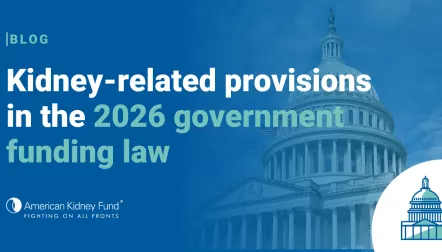
Blog post
What are 'superbugs' and what do they mean for people living with kidney disease

"Superbugs" – serious bacterial and fungal infections that do not respond to most antimicrobial treatments – already claim the lives of 35,000 Americans each year, according to the Centers for Disease Control and Prevention. Globally, the death toll exceeds 700,000.
By 2050, these infections could kill a staggering 10 million people worldwide each year – unless scientists are able to develop new, stronger antimicrobials to keep pace with ever-evolving superbugs.
People living with kidney disease are at risk. According to a recent study from researchers at Weill Cornell Medicine, people with kidney disease – and especially people on dialysis – experience some of the highest rates of drug-resistant bacterial infections. In fact, infection is the second leading cause of death for people on dialysis.
Sadly, the problem of antimicrobial resistance (AMR) has only gotten worse in recent years, as antimicrobials have grown increasingly ineffective at treating even some of the most common infections. If this global public health threat continues to grow unchecked, people living with kidney disease could face some serious risks in the years ahead.
In a world where antimicrobials no longer work against deadly infections, the kidney disease treatments available today could become riskier. That is because the infection risks associated with medical treatments like dialysis – which more than 555,000 Americans currently rely on to live – would be significantly higher than they are today. And kidney transplants would be more complicated than they are today, as the dangers of acquiring an infection could outweigh the potential benefits the procedure might provide.
Thankfully, the challenges posed by the AMR crisis can be addressed.
One problem is the broken pipeline for new, more powerful antimicrobial medicines. Since advanced antimicrobials are meant to be used sparingly, it's difficult for companies to financially sustain the research, development and commercialization for these drugs. Over the last decade, biotech companies brought 15 new antibiotics to market. But one-third of those companies have since abandoned antibiotics development or gone bankrupt.
The good news is that a number of promising policy reforms could help fix this broken marketplace and encourage biotech companies to invest in antimicrobial research. Among them is the Developing an Innovative Strategy for Antimicrobial Resistant Microorganisms (DISARM) Act, a bill that would reform Medicare reimbursements for these medicines and incentivize stewardship programs in hospitals.
Another bill, known as the Pioneering Antimicrobial Subscriptions to End Upsurging Resistance (PASTEUR) Act, would create a kind of subscription model for new antimicrobials, in which the government would pay for access to new products, rather than paying per the number of treatments needed.
Policy ideas like these are important, because they help incentivize companies to create innovative treatments, while also reducing the financial pressure to sell high volumes of them. And we know that anytime an antimicrobial medicine is used, it gives superbugs a chance to evolve and learn to resist the treatment.
These reforms could help foster antimicrobial innovation and stewardship, helping to curb the growth of drug-resistant superbugs. But they are only part of a larger strategy to defeat this global public health crisis. For the 37 million Americans living with kidney disease, the fight against AMR is one that can no longer wait.





